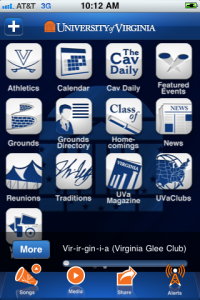-
Dr. Wertham has become a special sort of villain in the minds of comics aficionados. It will be interesting to hear what sorts of things surface from these papers.
-
Indeed. Proponents of jailbreaking don’t seem to realize that what they call “jailbreaks” others call “exploitable security vulnerabilities” that make it trivial for a hostile attacker to pwn the device.
-
In Defense of Links, Part One: Nick Carr, hypertext and delinkification — Scott Rosenberg’s WordyardNot all hyperlinks are created equal. Critiquing the written web by the standards of hypertextual fiction is misleading.
-
Interesting discussion of the intersection between IT, privacy and the honor system.
-
No wonder there is an anxiety of influence.
-
The highschooler who outsoloed Wynton Marsalis and other fun Seattle jazz stuff. Includes a callout to Matt Jorgenson.
Day: August 30, 2010
“Vir-ir-gin-i-a”: from the UVA iPhone app to Bob Dylan
 I was pleased to download and check out the University of Virginia’s new iPhone app. “One stop” doesn’t begin to cover the scope of this app — Grounds directory, news, alumni clubs, reunions, alumni magazine, the Cavalier Daily, sports scores (and notifications)…
I was pleased to download and check out the University of Virginia’s new iPhone app. “One stop” doesn’t begin to cover the scope of this app — Grounds directory, news, alumni clubs, reunions, alumni magazine, the Cavalier Daily, sports scores (and notifications)…
…and music. I was even more pleased to find the Virginia Glee Club‘s recording of “Vir-ir-gin-i-a” on the app’s list (along with marching band renditions of “The Good Old Song” and other Virginia tunes. While “Vir-ir-gin-i-a” seems an odd tune to represent Club–the recording from which the song was taken, Songs of Virginia, has many more familiar UVA related songs including the superb “Virginia, Hail, All Hail“–it’s actually an interesting tie to the past of both the University and the Glee Club.
“Vir-ir-gin-i-a” has many connections to the Glee Club. Featuring an arrangement by long-time Club conductor Donald Loach based on a tune by Handel, the text is by UVa professor Arthur Kyle Davis, Jr. (1897-1972). Davis himself sang in the Glee Club shortly after the group’s reformation by Alfred Lawrence Hall-Quest, serving as secretary during the group’s 1916-1917 season (during which Club performed the blackface musical “Oh, Julius!,” a minstrel-show story of life in ancient Rome). Davis went on to serve in the Army during World War I; went to Oxford on a Rhodes scholarship; and returned to the University as a professor in the English department in 1923.
And here’s where it gets interesting. Davis went on to his greatest fame as a folklorist, collecting three volumes of traditional ballad and folk songs through field research and becoming the archivist for the Virginia Folklore Society. The main thrust of his research was in showing that the English and Scottish ballads listed and enumerated by Harvard folklorist Francis J. Child (the “Child Ballads”) were alive and well on American soil for hundreds of years before their collection and numbering by Child.
While influencing numerous Virginia faculty, including Paul Gaston, his most unlikely influence was on folk singer and song collector Paul Clayton, a student of his in the 1950s, whose song “Who’ll Buy You Ribbons (When I’m Gone)” was “re-gifted” by Bob Dylan for “Don’t Think Twice, It’s Alright.” Of course “Who’ll Buy You Ribbons” was itself “re-gifted” from an Appalachian song called “Who’s Gonna Buy Your Chickens” which Clayton learned from Mary Bird McAllister, a song that was collected by Clayton while he was Davis’s student.
And “Vir-ir-gin-i-a”? Davis knocked it out in his spare time, apparently, in honor of the University’s sesquicentennial and premiered it himself at a meeting of the Jefferson Society. Loach arranged it for men’s voices for the 1972 Glee Club LP A Shadow’s on the Sundial, which financed the group’s first European tour, and it’s been in Club’s repertoire on and off since.
So while there are better known, and arguably better, pieces of Virginiana that could feature on future UVA app playlists, there are few that have so many interesting touchpoints to Glee Club, Virginia, and even pop music history.
